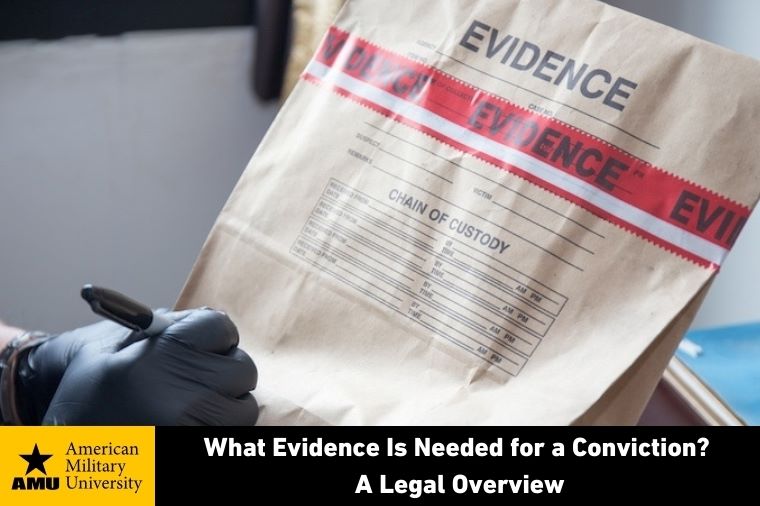By Dr. Jarrod Sadulski | 04/23/2025

Imagine being the victim of a crime. Typically, a suspect is arrested by police officers on criminal charges. You feel a sense of relief, believing that justice will be served since someone has been charged with a crime.
Then, the defense lawyer reviews the case and says that reasonable doubt exists because critical physical evidence was not collected properly. This scenario can be disheartening to victims suffering from the aftermath of a crime and reflects the importance of evidence collection in securing convictions.
The Discovery Phase and Defense Strategy
In the discovery phase of a case, an experienced criminal defense attorney receives the evidence against the accused. The defense lawyer examines the evidence to determine if it can convince a jury beyond a reasonable doubt of the defendant’s guilt. Prosecutors must present evidence that includes both direct and circumstantial evidence.
In criminal court, a defense attorney does not have to prove that a client did not commit the crime. Instead, the defense lawyer must prove that reasonable doubt exists. In other words, the defense lawyer must establish that the prosecution has not presented enough credible evidence to eliminate any uncertainty about the guilt of the accused.
Building a Strong Case: The Prosecutor’s Responsibility
A successful prosecution of a criminal case typically depends on the evidence presented in the case. A prosecutor must decide that what evidence is needed for a conviction before the case goes to trial to ensure that adequate evidence exists. To secure a criminal conviction, the prosecutor must prove beyond a reasonable doubt that the accused is guilty of criminal charges.
In a criminal case, direct evidence is a powerful way for a defendant to be proven guilty beyond a reasonable doubt. Direct evidence can include eyewitness testimony, physical evidence, and forensic evidence.
This type of evidence can include fingerprints, DNA samples, and other forms of forensic evidence. Direct evidence can show that someone is guilty beyond a reasonable doubt in a criminal case.
What Is Circumstantial Evidence?
Circumstantial evidence is less powerful in a criminal case. For example, one form of example of circumstantial evidence is cell phone records.
Cell phone records may show that the accused or someone else was in the area when a crime was committed. However, cell phone records are circumstantial and more evidence is needed to convince a jury of a defendant’s guilt.
Behavioral Clues: Flight and Nervousness
Another example of circumstantial evidence presented in some cases includes unusual behavior from the accused. This behavior can include being seen fleeing an area where a crime occurred or demonstrating nervousness during questioning by police investigators.
While a defendant fleeing a known crime scene or acting nervous during questioning is suspicious behavior, that behavior doesn’t always indicate guilt. Perhaps the accused left the area after hearing gunfire and didn’t want to become a victim.
Similarly, being questioned by police officers is nerve-wracking. A suspect might feel intimidation or may have had a negative experience in the past with law enforcement officers.
Suspicious Financial Activity
Circumstantial evidence may also include financial records. For example, if a defendant makes a large deposit following a robbery, having those funds may indicate guilt. However, this behavior is considered circumstantial evidence because it does not directly prove guilt.
Fingerprints
Even fingerprints are considered circumstantial evidence. The fingerprints found at a crime scene may suggest that a defendant was present, but the fingerprints do not necessarily prove with certainty that the accused committed a crime – only that the accused was there at the scene at some point.
Ideally, a good criminal defense attorney looks at the all of the circumstances and evidence in the criminal case.
The Role of the Jury and the Presumption of Innocence
In a criminal trial, a defendant is presumed innocent until proof beyond a reasonable doubt is established through the prosecution’s evidence. A prosecution’s case is often dependent on all of the evidence collected by law enforcement officers, including indirect evidence, and the guilt of the accused is often decided in a jury trial.
The Impact of Crime Scene Processing and Expert Testimony
Convincing evidence can lead a reasonable person to believe the crime was committed beyond a reasonable doubt. However, the strength of that evidence often depends on how well the crime scene was processed. Expert witnesses also play an important role in criminal trials, as their testimony can help establish the relevance and reliability of key evidence.
In my career in law enforcement, I have seen cases where someone provided false testimony. I have seen this situation occur mostly when a family member is used as a witness. Ideally, it is best for any witnesses to be independent witnesses and not a member of the defendant’s family.
How Prosecutors Secure a Conviction
To be found guilty, the burden of proof rests on the prosecution. It’s the prosecution’s responsibility to prove the defendant’s guilt beyond a reasonable doubt, not to eliminate all possible doubt. When a district attorney is unable to meet the burden of proof, the accused must be found not guilty.
Civil cases have a lower burden of proof. The burden of proof in a civil case only requires a preponderance of evidence, which is a lower threshold than proof beyond a reasonable doubt.
For someone to be charged with a crime, probable cause is required. Criminal cases require a jury to consider statements made for and against the accused.
To secure a conviction, the prosecution presents statements from witnesses in the trial to convince the jury the accused person committed the crime and should be convicted.
Evidence and Convictions: Meeting the Burden of Proof
Being convicted of a crime has major implications for the accused’s future, which is why it is crucial that the prosecution can accurately show that the accused person committed the crime. However, a defense attorney will try to convince the jury that a prosecutor did not meet the burden of proof needed for a conviction.
Proper Evidence Collection and the Chain of Custody
Properly securing evidence is critical in any criminal case. Crime scenes should be carefully preserved and law enforcement officers with the necessary training and experience should oversee collecting evidence.
Latex gloves are commonly used when handling evidence to ensure that evidence is not lost. Establishing a proper chain of custody is equally vital since it can make a difference between the accused’s innocence or guilt in a criminal case.
The Role of the Judge and Jury in Evaluating Evidence
Naturally, a judge has an important role in determining if other evidence should be introduced in court. During the court proceedings, the jury must listen to both the prosecutor and the defendant's attorney. Eventually, the jury will have to consider the direct evidence and decide on a verdict.
The defense often works to block evidence from being introduced in court. Evidence is often challenged by the defense, but the judge has the final say whether it can be introduced in the case.
Evidence Disputes During the Discovery Phase
It is common for arguments to be made about whether evidence can be used in a criminal case during the discovery phase. The prosecutor must give the defense all the evidence they plan to use in the case during the discovery phase. To find the accused guilty, any critical fact introduced in the trial should be evaluated by the judge and jury.
Self-Defense Laws and Burden of Proof Vary by State
Self-defense laws vary significantly based on the jurisdiction of a case, and the burden of proof in one state may be different than another state. In self-defense cases, an affirmative defense (a special type of defense) is common.
The burden of proof needed to secure a conviction is commonly explained during jury instructions. Different cases have varying burdens of proof, and the burden of proof is on the accuser.
When a suspect is arrested, it is common for that person to contact a law office for a free case evaluation. Some criminal defense attorneys offer a free case review.
Settling the Case and Securing Convictions
In the pursuit of justice, the strength of a criminal case often comes down to the quality and handling of evidence. Whether direct or circumstantial, properly collected and presented evidence is essential to meeting the high standard of proof required for conviction.
When evidence is mishandled or insufficient, it not only jeopardizes the prosecution’s case but can also erode public trust in the justice system. Ensuring fairness for both victims and the accused starts with meticulous attention to the evidence from the very beginning.
Criminal Justice Degrees at American Military University
For students who want to gain the knowledge and skills needed to become law enforcement officers or criminal investigators, American Military University (AMU) provides four criminal justice degrees:
- An online Associate of Arts in Criminal Justice
- An online Bachelor of Arts in Criminal Justice
- An online Bachelor of Science in Criminal Justice
- An online Master of Arts in Criminal Justice
Courses in these degree programs are designed to meet the professional goals of criminal justice students. These courses include criminal investigation, evidence and procedures, and intercultural communication. Other course choices include crime analysis, criminology, and digital forensics.
For more details, visit AMU’s criminal justice degree program page.
Note: These degree programs are not designed to meet the educational requirements for professional licensure or certification in any country, state, province or other jurisdiction. These programs have not been approved by any state professional licensing body and does not lead to any state-issued professional licensure.

Dr. Jarrod Sadulski is an associate professor in the School of Security and Global Studies and has over two decades in the field of criminal justice. He holds a bachelor’s degree Criminal Justice from Thomas Edison State College, a master’s degree in criminal justice from American Military University, and a Ph.D. in criminal justice from Northcentral University.
His expertise includes training on countering human trafficking, maritime security, mitigating organized crime, and narcotics trafficking trends in Latin America. Jarrod has also testified to both the U.S. Congress and U.S. Senate on human trafficking and child exploitation. He has been recognized by the U.S. Senate as an expert in human trafficking.
Jarrod frequently conducts in-country research and consultant work in Central and South America on human trafficking and current trends in narcotics trafficking. Also, he has a background in business development. For more information on Jarrod and links to his social media and website, check out https://linktr.ee/jarrodsadulski.

